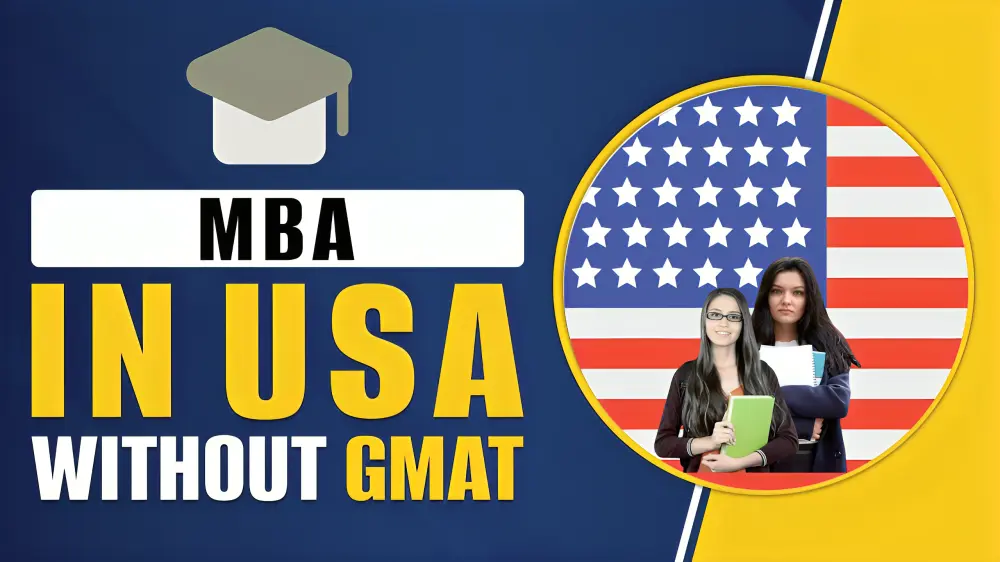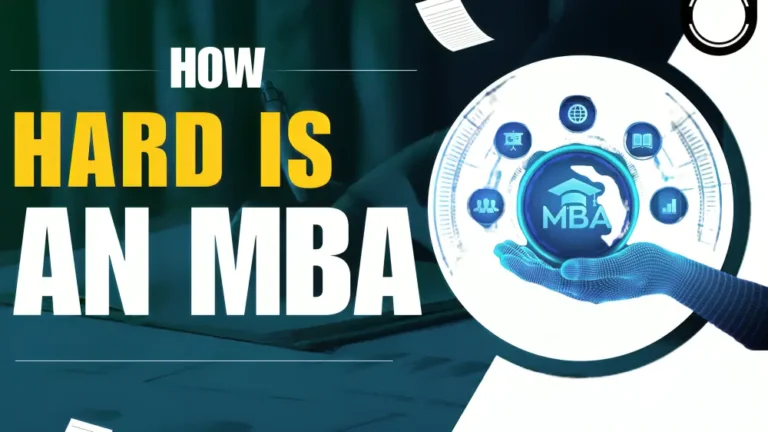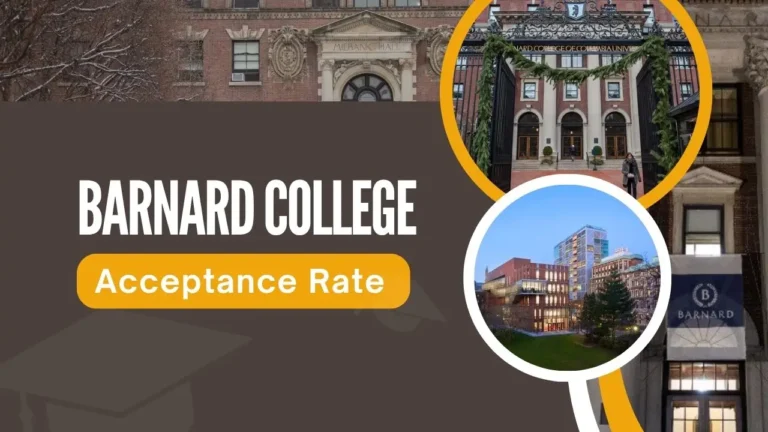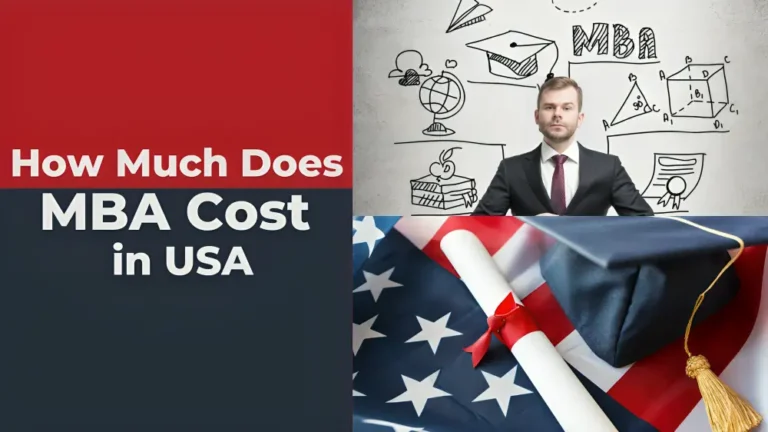MBA in USA without GMAT 2025: A Complete Guide
Getting an MBA in the US is a desire shared by many aspirational individuals and business leaders worldwide. For many years, entrance to most MBA programs in the United States has required passing the Graduate Management Entrance Test, or GMAT. To make the admissions process more flexible and accessible for a wider range of applicants, some prestigious business schools have recently begun to offer MBA programs without GMAT requirements. This article will cover all you need to know about an MBA in USA without GMAT, including its advantages, requirements for admission, best colleges, and how to improve your application.
Advantages of Studying MBA in USA without GMAT
- The need for financial managers is expected to increase by 11% by 2026.
- Without GMAT scores, the application process is faster, enabling you to start your MBA sooner.
- Possibilities to work with prominent firms like Cognizant, Amazon, Accenture, Deloitte, and Google
- The employment rate within three months of graduation is 82.8%, according to US News and other foreign newspapers.
- The US Bureau of Labor Statistics projects that employment in management occupations will increase by 9% between 2020 and 2030, creating approximately 906,800 new jobs.
- There is no need to take time off for studying or pay the around 23,000 to 26,000 INR required for GMAT enrollment.
Top MBA Colleges in USA waiving-off GMAT
- Boston University: The Boston University MBA program is open to a larger pool of applicants because it does not require the GMAT for admission. Standardized examinations are not as important to BU as candidates’ diverse backgrounds and experiences, which enables a more thorough assessment. In addition to three to five years of extensive work-life experience, a strong academic record in a four-year undergraduate degree is essential.
- University of Maryland: Thanks to the University of Maryland’s careful relaxation of the GMAT requirement, it is now possible to pursue an MBA in the United States without taking the test. This enables candidates to demonstrate their abilities beyond exam results. Candidates must have excellent academic credentials and provide evidence of their readiness for the program, such as three years of professional experience and a first-class undergraduate degree in a related discipline.
- Babson College: Babson’s MBA program stands out for its innovative admissions strategy, specifically the abolition of the GMAT requirement for entry beginning in 2024. This measure indicates Babson’s commitment to attracting a diverse candidate pool by valuing professional experience and a variety of backgrounds above test scores. In addition to eliminating the GMAT, Babson’s program welcomes international students, assists with visa requirements, and prioritizes English language proficiency for non-native speakers.
- USC Marshall: The dynamic MBA program at USC Marshall School of Business accepts applicants without requiring a GMAT score. Students may tailor their MBA experience to suit their own interests and career goals thanks to the program’s variety of specializations and dual-degree possibilities. The inclusive MBA program at USC Marshall allows prospective students to earn an MBA in the United States without taking the GMAT. Instead, the focus is on non-native English proficiency, essays, academic records, and a professional resume. Academic transcripts from a four-year undergraduate degree or its equivalent at an accredited university are necessary, but reference letters are not.
- University of Illinois Urbana-Champaign: Aspiring business leaders in the United States can earn an MBA from the University of Illinois Urbana-Champaign without taking the GMAT. The UIUC advocates for broadening pathways to academic success. As a result, they are now accepting MBA candidates with no GMAT scores and, in turn, allowing for a wider selection of people applying to an M.B.A. A bachelor’s degree received from an accredited institution and the attainment of your final years’ undergraduate degree with a minimum GPA of 3.0 are vital requirements. International applicants need to additionally demonstrate their English language proficiency and meet different requirements. The PAT route, which provides a more streamlined application process, is also available at UIUC. As a result, UIUC provides numerous entry options to its MBA program, with a focus on academic success.
Why are many schools allowing an MBA in USA without GMAT?
- Development of Proprietary Exams: Several MBA schools have developed unique examinations or alternative assessments to better assess applicants based on their program aims. These tailored exams typically better match the curriculum and learning objectives of the program.
- Meeting the Needs of the Market: The GMAT-free MBA course in the USA caters to the fast-evolving professional landscape. They also maintain a strong response, which is more aligned with the industry and the needs of businesses and sectors by offering GMAT exemptions, which probably attract prospective students from diversified backgrounds.
- Holistic Review Approach: A marked shift in admission committee reviews has also emerged in the direction of more holistic evaluation. This perspective considers multiple qualitative factors in addition to test scores. These include market-based components like reference letters, personal essays, and interview performance, as well as other hard-to-quantify signals of a candidate’s fit for the program.
- The Power of Flexibility: Given the diversity of candidate profiles and experiences, some MBA schools are showing a willingness to compromise on their admission criteria. Such flexibility, as evidenced by the removal of the GMAT requirement, allows for a more holistic assessment of candidates. It allows for assessing a number of factors — previous work experience, academic success and natural leadership ability.
Admission Requirements for MBA without GMAT in the USA
- Make a strong CV.
- Send in recommendation letters.
- Create a compelling mission statement.
- Most programs require a bachelor’s degree and a minimum GPA of 3.0.
- Your undergraduate program will determine whether you require two to three years of job experience.
- For standardized assessments, few programs accept GRE scores instead of GMAT results.
- English competence by providing results from the TOEFL (600) or IELTS (7.0).
Tips for Preparing and Applying
- Choose an MBA program according to your interests and career goals.
- Speak with others showing your communication skills.
- Compare the prerequisites of several institutions to find the perfect program for you.
- To highlight your abilities, highlight your accomplishments and professional background.
- Verify your eligibility by looking at the program’s minimal GPA, job history, and English proficiency.
- If necessary, look into taking the GRE instead of the GMAT because certain colleges accept it.
- Speak with industry experts who can help you with the application process and improve your chances of acceptance.
Conclusion
Pursuing an MBA in the United States without a GMAT offers more flexibility and accessibility for a diverse group of applicants. At elite colleges like Boston University, USC Marshall, and Babson College, professional experience, academic success, and thorough application assessments are now more important than test results. As the workplace evolves, candidates may now showcase their skills and future opportunities outside of conventional testing.






